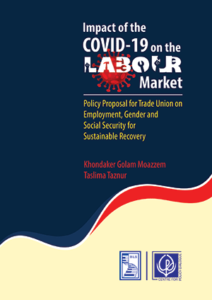 Impact of the COVID-19 on the Labour Market
Impact of the COVID-19 on the Labour Market
Policy Proposal for Trade Union on Employment, Gender and Social Security for Sustainable Recovery
After the profound impact of the COVID-19 pandemic on the global economy, particularly on the world of work during the first half of 2020, a major part of the global economy since then has been struggling for rebounding and recovery. The key stakeholders in the labour market – most importantly, trade unions of different countries have been playing an active role throughout the crisis period, particularly addressing the challenges of the labour market and those of the workers. The most vulnerable among the workers were regular, temporary or casual workers, self-employed and small entrepreneurs of different sectors, including Micro Small and Medium sized Enterprises (MSMEs), construction, road, commerce, tourism, and other informal sectors. Bangladesh being a labour-abundant Least Developed Country (LDC), confronted the adversity to a large extent. With a GDP growth rate of 5.2 per cent in FY2020 (official estimates), an estimated 11 million job loss was estimated during the early phase of the first wave (April-May 2020), which has not fully recovered in the following period. Even the recovery would be further delayed due to the late attack (from March 2021) of the second wave of the COVID in the country.
The public policies and employers’ actions in dealing with challenges concerning the world of work and workers have been largely influenced by the active participation of the trade unions. According to ILO, (2021), 108 out of 133 countries have used social dialogues as a key instrument to address the concerns of workers. Trade unions have been involved in tripartite and bipartite dialogues, bilateral negotiations and protesting violations against workers’ rights and trade union rights. Like other countries, trade unions in Bangladesh have played an active role both in humanitarian issues and workers’ rights issues during this crisis period. A detailed review of their activities would help understand the nature and extent of their engagement, their capacities in influencing national and international policies and employers’ activities, as well as the gaps in activities where further engagement is expected in the future.
Trade unions in Bangladesh need to revisit their activities and engagements during the pandemic period and take lessons from trade unions’ activities in other countries to identify the areas of future engagement during the process of sustainable recovery. Based on that review, a detailed policy proposal for trade union would be formulated with a special focus on employment, social security and gender-related issues. Such a policy proposal will consider the long-term policies and strategies, including Eighth Financial Year Plan, national jobs strategy and national social security strategy, etc.
Authors: Dr Khondaker Golam Moazzem and Ms Taslima Taznur
Publication period: August 2021



